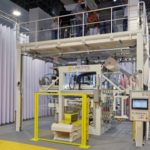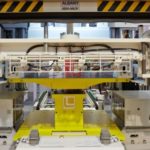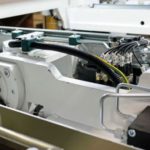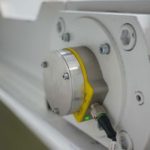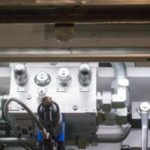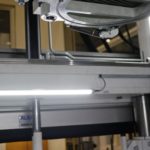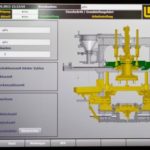Laempe Mössner Sinto GmbH uses IO-Link in a new core shooter machine and achieves shorter cycle times with Turck’s QR24-IOL IO-Link encoder
When the foundry machinery manufacturer Laempe Mössner Sinto planned the new LHL machine series, it decided to implement the entire automation for this with IO-Link. This produces several benefits: Besides costs, the manufacturer also saves the time required for the installation, wiring and electrical planning, while customers benefit from a more dynamic and faster machine. Faults occur less often and can be diagnosed and rectified more easily. The swing movement of the core box carrier has a major influence on the cycle time of the machine, and this can now be measured by Turck’s QR24-IOL contactless IO-Link encoder.
Laempe Mössner Sinto is a global leader in core shop technology for the foundry industry and one of the few manufacturers of core shooters worldwide. The machines produce sand cores for metal casting. If, for example, the casting of an engine block is required, cores are placed inside the casting mold to later produce the cavities of the engine. A key objective of core shooter manufacturers here is short cycle times.
IO-Link enables innovation leap
The new LHL machine generation is an innovation leap in terms of its automation. “We have incorporated many intelligent components in our machines, which before normally had a bus connection. This meant that we had to connect the operating voltage and two bus lines individually to a positioning system. All three lines were run on drag chains and were consequently put under severe stress,” Lipsdorf describes the previous wiring.
IO-Link rectifies many of these disadvantages: the two bus lines plus power supply are replaced with a standard three-wire cable which is run in the drag chains of the LHL30. All intelligent analog sensors and devices now have an IO-Link interface and are connected to the PLC via an IO-Link master, while simple proximity switches and digital actuators are connected via IO-Link-capable hubs. Sixteen switch signals can be connected via a standard three-wire cable, which keeps wiring effort down to a minimum and also enables the implementation of basic diagnostics for the proximity switches.
End position detection problematic
The upper part of the core box on the core shooter can be swung 90 degrees out from its production position to a maintenance position. The swing movement was previously detected with end position switches. This solution wasn’t without its problems, as Lipsdorf explains: “Even if we only detected the end positions, it was difficult to find a suitable point for mounting the sensors. In order to detect the exact position, the design required us to fit initiators on the outside. However, the available mounting space for the required holders was limited.”
IO-Link encoder detects swing of upper core box
The solution was to detect the entire swing movement. If the rotation movement was detected at the axis of rotation, one bearing point for mounting the encoder was guaranteed, without the need for any additional supports. “For this we looked for an encoder which was as robust as possible, i.e. with contactless operation, and which had an IO-Link output. Turck’s QR24 encoder met all our requirements and successfully passed all our tests, so that we no longer had to look any further,” electrical planner Andre Klavehn, describes the fast product selection process.
Click a thumbnail image for full size picture:

